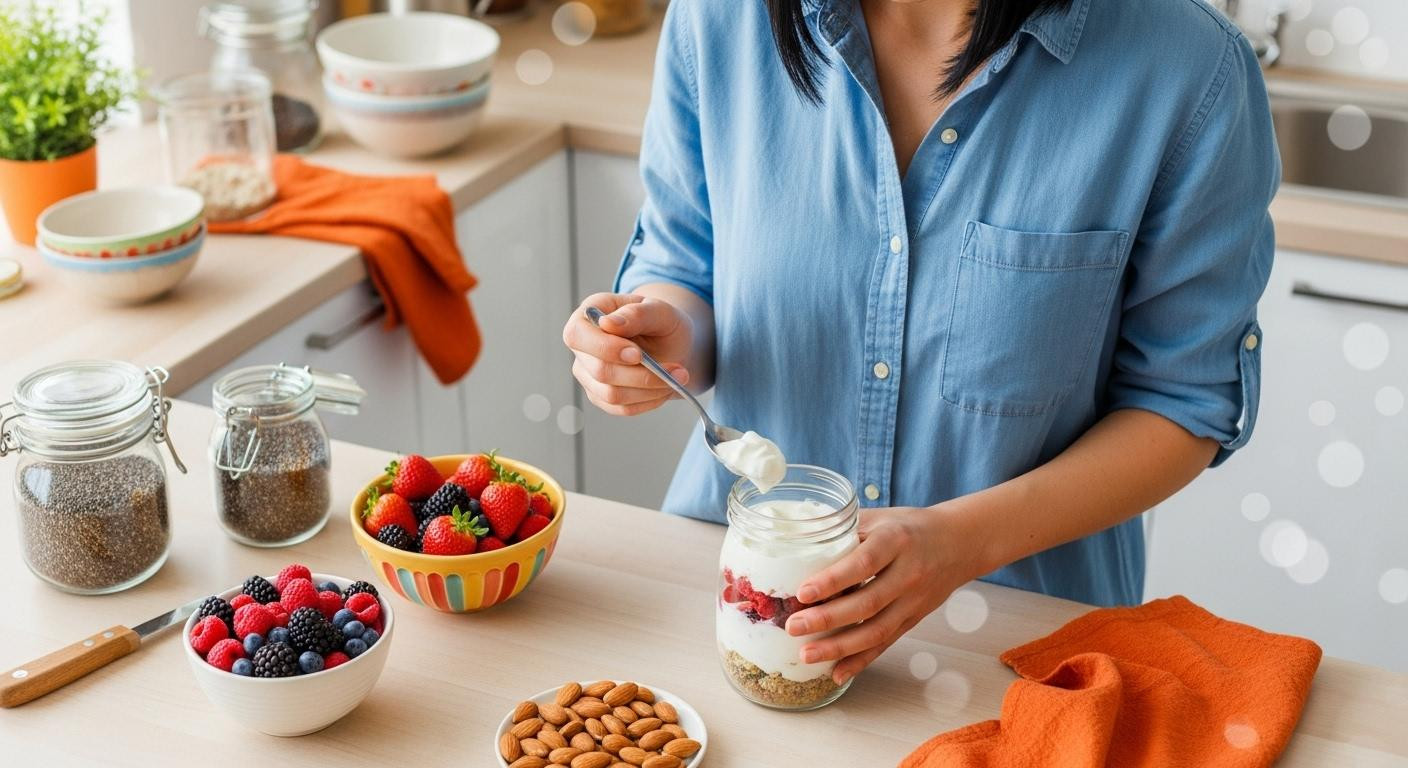Open your fridge this morning. That Greek yogurt container sitting next to leftover takeout? Add a handful of almonds from your pantry. Sprinkle those chia seeds gathering dust in your cupboard. You’ve just created a 20-gram protein, 8-gram fiber snack for under $1.50. While Americans spend $10-15 on single protein bars, culinary professionals with years of recipe testing confirm your kitchen already contains fiber-protein goldmines. Fall 2025 transforms comfort snacking with 13 recipes using everyday ingredients costing just $15 weekly total.
The kitchen staples hiding fiber-protein power
Your pantry holds nutritional treasures most people overlook. Greek yogurt delivers 23 grams of protein per cup at $0.38 per serving. Cottage cheese provides 25.5 grams of protein for just $0.32.
Dried chickpeas transform into 14.5-gram protein powerhouses with 12.5 grams of fiber per cooked cup. One can costs $1.59 and yields 2.5 servings of roasted snacks.
Food scientists studying ingredient interactions note that eggs provide complete amino acid profiles at 6.3 grams protein per large egg. Almonds deliver 6 grams of protein plus 14 grams of healthy fats per ounce. Chia seeds offer 5.5 grams of fiber per tablespoon with omega-3 fatty acids.
Nutritional yeast provides 8 grams of protein per tablespoon while adding B12 vitamins. Your $180 protein powder promises what these $2-5 pantry staples already deliver.
13 recipes by prep time (no cooking skills required)
These combinations require zero culinary training. Assembly time determines your snack strategy based on available minutes.
Instant combinations (0-2 minutes)
Greek yogurt parfait: 1 cup yogurt, mixed berries, sliced almonds. Total: 22 grams protein, 6 grams fiber, $1.80. Cottage cheese bowl with cucumber and everything bagel seasoning delivers 26 grams protein for $1.50.
Apple slices with 2 tablespoons almond butter provide 4 grams protein and 5 grams fiber. Cost per serving: $1.20. These combinations satisfy hunger for 3-4 hours.
Fast assembly (3-5 minutes)
Trail mix revolutionizes snacking economics. DIY version costs $0.50 per serving versus $1.65 for store-bought. Combine almonds, dried cranberries, dark chocolate chips using the 4:2:1 ratio.
Edamame rice cakes deliver 13 grams protein and 4 grams fiber per serving. Steam frozen edamame for 5 minutes, mash onto whole grain crackers. Hard-boiled eggs with avocado mash provide sustained energy with 14 grams protein and 7 grams fiber.
Batch-prep winners (15 minutes makes 12 servings)
Sunday preparation transforms your week. Roasted chickpeas cost $0.40 per serving when batch-cooked. Toss 2 cans with paprika and apple pie spice, roast at 425°F for 25 minutes.
Egg muffins combine 6 eggs with spinach and diced pumpkin. Bake at 375°F for 18 minutes, yielding 4 muffins at $0.90 each. Peanut butter energy balls using oats and chia seeds provide 5 grams protein and 4 grams fiber per $0.60 serving.
Strategic shopping that slashes costs 60%
Smart substitutions eliminate premium product markups. Replace $15 protein bars with $4 Greek yogurt bulk containers providing 12 servings. Pre-made trail mix costs $12 while DIY ingredients total $8 for 16 servings.
Batch-prep economics
Two cans of chickpeas ($2 total) yield 8 grab-and-go servings when roasted Sunday. Making 12 egg muffins costs $4.50 versus $3 each store-bought. Weekly investment: $15 covers all 13 recipes with 50% time savings compared to daily preparation.
Glass containers preserve 92% protein integrity at day 7 versus 84% in plastic. Store roasted chickpeas 7 days airtight, egg muffins 5 days refrigerated, energy balls freeze 3 months for extended meal prep.
Cost comparison validation
Cottage cheese bowl delivers 25.5 grams protein for $0.92 total cost. Commercial protein bars provide 20 grams protein for $3.49. Per gram of protein, homemade options cost $0.036 versus $0.175 for processed alternatives.
Beef jerky reaches $0.179 per protein gram while containing 520mg sodium per serving. Your weekly $15 budget provides 105 grams daily protein versus $52 for commercial equivalents.
Why fiber plus protein transforms hunger
Protein activates satiety hormones while fiber slows glucose absorption. This combination maintains stable blood sugar for 3.2 hours versus 45-minute simple carb crashes. Nutrition researchers studying appetite regulation confirm protein’s thermic effect burns 89 extra calories daily.
Clinical studies demonstrate that 30 grams protein plus 8 grams fiber reduces ghrelin (hunger hormone) for extended periods. Fiber feeds beneficial gut bacteria producing short-chain fatty acids that support immune function.
Fall 2025’s seasonal advantage includes warm chickpea soups and roasted snacks satisfying comfort cravings nutritionally. Recent meta-analyses of 300,000 participants show 28 grams daily fiber reduces diabetes risk by 32% and cardiovascular disease by 24%.
Your questions about high-fiber, high-protein snacks answered
Can I prep these Sunday for the entire week?
Yes, with proper storage protocols. Egg muffins and roasted chickpeas stay fresh 5-7 days refrigerated in airtight glass containers. Energy balls freeze successfully for 3 months, thawing overnight in refrigerator. Greek yogurt parfaits assemble best morning-of in 2 minutes for optimal texture.
Do I need protein powder for 20 grams daily protein?
No supplementation required. Whole foods like cottage cheese provide 25 grams per cup, cooked lentils deliver 18 grams per cup, Greek yogurt supplies 23 grams per cup. Two snacks from these recipes provide 30-40 grams combined protein naturally at lower cost than powders.
Which combinations work best for sustained energy?
Pair healthy fats, protein, and fiber for maximum satiety. Almond butter (fat) plus apple (fiber) plus Greek yogurt (protein) extends fullness 3-4 hours per nutritionist research. This trio prevents afternoon energy crashes while supporting stable glucose levels throughout your day.
Your kitchen counter tomorrow morning: cottage cheese container, almond jar, chia seed bag arranged like a convenience store snack aisle. But this costs $4 total, delivers 45 grams protein, 20 grams fiber, and transforms October meal prep. No exotic ingredients. No complicated recipes. Just strategic combinations nutritionists have validated for decades.

